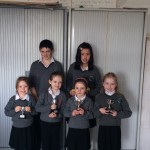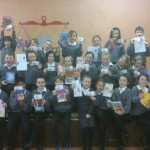Today we celebrated World Book Day in St. Attracta’s. It was a fantastic opportunity to share our love of books and reading. As you can see from our 3rd and 4th Class Picture exciting activities took place in all our classes.Here Mr. Rushe’s Class are proudly displaying their Book Reports of the favourite books.
Reading for pleasure is a very hot topic on the literacy agenda, as it not only creates a love of reading in young people, but also make a huge contribution to their educational attainment
A recent British Study into the role of reading found that …
- Children who read for pleasure are likely to do significantly better at school than their peers.
- Children who are read to regularly by their parents at age 5 perform better in tests age 16 than those who were not.
- Reading for pleasure has the strongest effect on Children’s Vocabularly Development , but the impact on spelling and maths is also significant.
- Children who read for pleasure make more progress in Maths, Vocabularly and Spelling between the ages of 10 and 16 than those who rarely read.
(Institute of Education 2013)
Please find below ways that you can help your child improve their reading.
Ten Tips to Help your Child’s Reading At Home.
1.Choose a Quiet Time:Set aside a quiet time with no distractions. Ten to fifteen minutes is usually long enough.
2.Make Reading More Enjoyable:Make reading an enjoyable experience. Sit with your child. Try not to pressurise if he or she is reluctant. If your child loses interest then do something else.
3.Maintain the Flow:If your child mispronounces a word do not interrupt immediately. Instead allow opportunity for self-correction. It is better to tell a child some unknown words to maintain the flow rather than insisting on trying to build them all up from the sounds of the letters. If your child does try to ‘sound out’ words, encourage the use of letter sounds rather than ‘alphabet names’.
4.Be Positive:If your child says something nearly right to start with that is fine. Don’t say ‘No. That’s wrong,’ but ‘Let’s read it together’ and point to the words as you say them. Boost your child’s confidence with constant praise for even the smallest achievement.
5.Success is the Key:Parents anxious for a child to progress can mistakenly give a child a book that is too difficult. This can have the opposite effect to the one they are wanting. Remember ‘Nothing succeeds like success’. Until your child has built up his or her confidence, it is better to keep to easier books. Struggling with a book with many unknown words is pointless. Flow is lost, text cannot be understood and children can easily become reluctant readers.
6.Visit the Library:Encourage your child to use the public library regularly.
7.Regular Practice:Try to read with your child on most school days. ‘Little and often’ is best. Teachers have limited time to help your child with reading.
8.Communicate:Your child will most likely have a reading diary from school. Try to communicate regularly with positive comments and any concerns. Your child will then know that you are interested in their progress and that you value reading.
9.Talk about Books:There is more to being a good reader than just being able to read the words accurately. Just as important is being able to understand what has been read. Always talk to your child about the book; about the pictures, the characters, how they think the story will end, their favourite part. You will then be able to see how well they have understood and you will help them to develop good comprehension skills.
10.Variety is Important:Remember children need to experience a variety of reading materials eg. picture books, hard backs, comics, magazines, poems, and information books.



